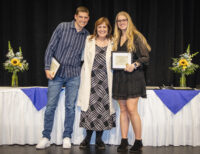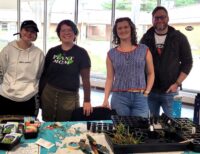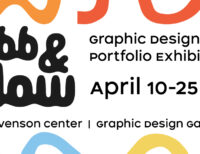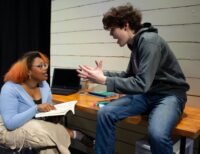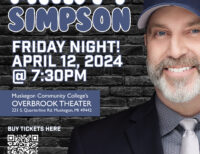By Peter D. Koryzno, MCC Communications Manager
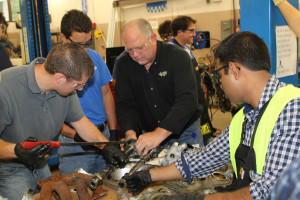 In mid-August, one longtime Muskegon institution, CWC Textron, sought the assistance of another, Muskegon Community College, to educate its upper management employees about how its product works and to explore other manufacturing possibilities in an ever-changing market.
In mid-August, one longtime Muskegon institution, CWC Textron, sought the assistance of another, Muskegon Community College, to educate its upper management employees about how its product works and to explore other manufacturing possibilities in an ever-changing market.
“We had really been searching for somebody who could assist us in an engine tear down so we could learn a lot more about the inner workings of an engine,” said Erik Jepsen, director of operations at CWC Textron.
“Obviously, as an original equipment manufacturer, we wanted to understand kind of how our product works within an engine. We have a lot of younger engineers and people new to the business, so we wanted them to gain a little more knowledge for their talent development and growth, as well as to what other products are available within the engine that we could potentially manufacture at our facility.”
Founded in 1905, CWC Textron employees 305 workers primarily producing ductile iron camshafts for the auto industry at its foundry on Sherman Avenue.
“Toyota is the largest part – about 50 percent – of our business,” said Jepsen. “We supply all of the North American vehicles made by Toyota. They have a CWC camshaft in them. We also work with Chrysler, Ford and General Motors.”
“We also service the aftermarket portion of the camshaft market as well. Then we make about one million bearing caps and couple hundred thousand balance shafts for John Deere. We’ll produce about 11 million camshafts this year, then the additional million bearing caps.”
Jepsen approached MCC for help with his project. The college prides itself on its flexibility to provide specialized instruction to local firms.
“The difference between this training and our typical business and industry training is that typically our training is for entry level skills,” explained Tom Martin, chair of the MCC Applied Technology Department. “This was an application where we actually had upper management from the company come in to learn the basics about something they would never have received in a business degree program. So they have a better knowledge of the product that they’re selling.”
“That makes a huge difference because when I was in industry, every sales guy had an application engineer to go to,” added Martin, who holds a degree and worked in engineering. “You don’t see that same depth in the management ranks anymore. The sales guy has to be THE technical guy and most of the sales guys are sales management-type guys. They have to learn the technical. So this is really kind of a cool change for us.”
Al Thomas, who teaches automotive technology at MCC, was the logical choice to work with CWC’s engineering, human resource, sales, finance and operation staff. Thomas, with a master’s degree in computer information systems, has experience as a longtime mechanic, a dynamometer test engineer at Mahle Corporation, and as a student of cast metals technology at MCC.
“The students were well educated so there was no underlining need to explain things thoroughly,” explained Thomas. “They already had concepts in place. They knew what everything was. The biggest challenge was keeping their interest and providing enough activity because they are well focused, wanted to move along and didn’t want their time wasted. They were very good students and all of them were here for a purpose.”
At the outset, Thomas discussed safety, how an internal combustion engine works, what the group was going to do in the lab, and his expectations of them. Then they got their hands on a pair of General Motors engines, disassembling each one part by part with Thomas offering his insights every step of the way.
“We compared an older engine to a newer engine to see what changes have been made throughout a period of time between the engines,” recounted Thomas. “We already knew that the new engine had been lightened up considerably. It had lost about 100 pounds over a period time and added about 100 horsepower. Both were General Motors engines that they traditionally poured camshafts for, but not the newest engine from GM. It’s an assembled camshaft made from powdered metal and a steel tube and not cast iron.”
Jepsen knew that the experience would be an eye-opening one for his CWC staff.
“We were hoping to find a way to make our products better, or to come up with a new product for the engine, or to figure out what else we can make within the engine so we can continue to be in business for another 120 years,” he said.
“We definitely gained a lot of knowledge. I think Al did a great job of kind of questioning and challenging us a little bit on our thought process. I think there are potentially other opportunities for us to work together in the future as well.”
“Our HR team has been working pretty closely with the college on our apprenticeship program and some of the classes for the skilled trades’ employees. We’re getting a little bit more of a partnership there as well. As we continue to grow, we’re going to continue to need new talent and new skills. Hiring younger talent is definitely a competitive advantage in the business world.”
To learn more about MCC’s workforce training opportunities, contact Cyndi Langlois at (231) 777-0456 or by email at Cyndi.langlois@muskegoncc.edu


